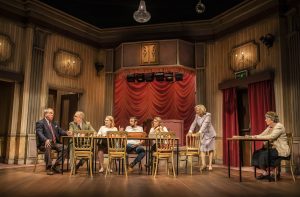
Directed by Robin Herford, Ten Times Table is the inaugural production of the Classic Comedy theatre company, produced by Bill Kenwright and his team behind other sister compaies: the Agatha Christie, the Classic Thriller, and the Classic Screen to Stage theatre companies – which between them have enjoyed over 15 years of theatrical success across the UK. Somehow, this relic script has long outlived its bedtime and appears to be reaping similar attention.
Perhaps best packaged as mild folk horror as opposed to uproarious comedy, Alan Ayckbourn’s play follows the endeavours of local committee members to conduct their business of running the Pendon Folk Festival. In the back room of a forgotten hotel, excitable chairman Ray guides this band of angry men and women from scathing indifference through simmering prejudice to petty war.
Pitting Marxist schoolteacher against military dog-breeder and haughty committee wife, enrolling an octogenarian secretary, the table is set for a tumultuous examination of class, gender and generation. Unfortunately, for all its observation, it ultimately lacks any punch. Playing to a full but mixed audience, Robert Daws’ Chairman often resorts to pantomime glances and an over-reliance on the Ricky Gervais awkward squeal to elicit a reaction, which are few, far-between and from a very select faction.
The cast also features Deborah Grant as the assertive Mrs Dixon, Mark Curry as the enthusiastic and proper Mr Evans, Robert Duncan as the alcoholic Laurence, Elizabeth Power as the deaf and marginalised Mrs Evans, Harry Gostelow as toffy ex-military captain Tim, Gemma Oaten as the lost Sophie and Craig Glazey as the wry Eric Collins, with peeps of appearance from Rhiannon Handy as Phillipa.
Incredibly dated in its sensibilities even for its time (1977), the play drops casual cherry-bombs on race, class and gender all over the place, siding heavily with the richer classes and making a clown of the one character outside that elite group. It shows a crass neglect in editing to include a line snarking that Russians “wouldn’t notice” the cold, ignoring global warming’s increasingly fatal winters suffered there most achingly. The pageant itself is supposedly based on a lost piece of local history; the massacre of the Pendon Twelve – in which the Earl of Dorset crushed an uprising of rebellious workers, led by John Cockle. No prizes for guessing who will re-enact who.
Following months of inevitable discord among the committee members during its planning, the day finally arrives with the two sides having firmly embodied the parties of the original conflict. The pageant ends in the expected chaos, and diligent secretary Mrs Evans reveals that research shows there is actually no historical authenticity to the Pendon Twelve Massacre.
A comedy of pomp and chest-puffing, the script presumes an innate hilarity of manners, and thus their interruptions, while the company contrarily places no trust in the dialogue, instead relying on cheap narrative shortcuts to make their point. Eric’s fluffed delivery of his political speeches makes for uncomfortable viewing in the UK of today. The second half strays into unwarranted darkness, including a completely irrational violent confrontation as well as the hint at Mrs Dixon having been sexually assaulted – by a character otherwise unseen – before she is quickly bundled into a car to go home, which adds an absurdist sense of irreverent futility and emotional detachment. The lively, capable cast have their hands tied by this decidedly underwhelming production left wanting for rhythm. Power saves the evening in select moments, hurrying to the bar for a drink despite her son’s protestations, and playing out a perfect reaction to Captain Tim’s arrogant co-opting of her active knitting needle.
Ten Times Table plays at Grand Opera House York until Saturday 15 February, tickets available here.



